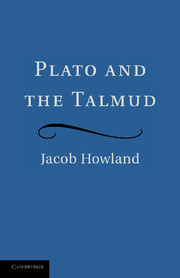Book contents
- Frontmatter
- Contents
- Acknowledgments
- Introduction: Athens and Jerusalem
- 1 Talmudic and Platonic Writing
- 2 Rabbis and Holy Men
- 3 Prophets and Philosophers
- 4 Fathers and Sons
- 5 Words and Deeds
- 6 Gods and Men
- 7 Miracles and Necessity
- Epilogue: Texts and Traditions
- Works Cited
- Index to Biblical and Rabbinic Texts
- General Index
4 - Fathers and Sons
Published online by Cambridge University Press: 10 November 2010
- Frontmatter
- Contents
- Acknowledgments
- Introduction: Athens and Jerusalem
- 1 Talmudic and Platonic Writing
- 2 Rabbis and Holy Men
- 3 Prophets and Philosophers
- 4 Fathers and Sons
- 5 Words and Deeds
- 6 Gods and Men
- 7 Miracles and Necessity
- Epilogue: Texts and Traditions
- Works Cited
- Index to Biblical and Rabbinic Texts
- General Index
Summary
Ḥoni HaMe'aggel, as we saw in Chapter 2, poses a kind of Talmudic riddle. Presented in Ta'anit 3 as a curious combination of prophet and rabbi, he is both a “son” to God and a “father” to his disciples and to the people Israel – a protector and savior of the community because of his mysterious closeness to the Lord. But for all its praise of Ḥoni, the Gemara makes clear just what is missing in his life: the genuine partnership and friendship that can take root and grow only between equals. This is the lesson the Gemara draws from Ḥoni's inability to make himself known to the rabbis of the academy, a detail that stands as Ta'anit's last word on this heroic but ultimately lonely man. “Either companionship or death,” Rava brusquely concludes (23A, II.121) – implying that a solitary life is not worth living, and that it is in the academy that the human potential for meaningful friendship is most fully realized.
For the rabbis, academic life binds human beings with each other and with God in relationships that have distinct filial and paternalistic elements. At the highest level, however, the rabbis are – or aspire to be – a community of equals. This is the community of sages jointly engaged in study. To become a sage, one must first have learned at the feet of a master; to be a sage means also to be a master to one's own disciples.
- Type
- Chapter
- Information
- Plato and the Talmud , pp. 132 - 163Publisher: Cambridge University PressPrint publication year: 2010



